Robert Simanek was a US Marine who received the US military’s highest award – the Medal of Honor – for his heroics during the Korean War, jumping on a grenade to save his comrades. In 2021, it was announced he would have a US Navy vessel named for him and, on September 12, 2024, the Lewis B. Puller-class mobile expeditionary base was officially delivered.
Robert Simanek enlisted in the US Marine Corps
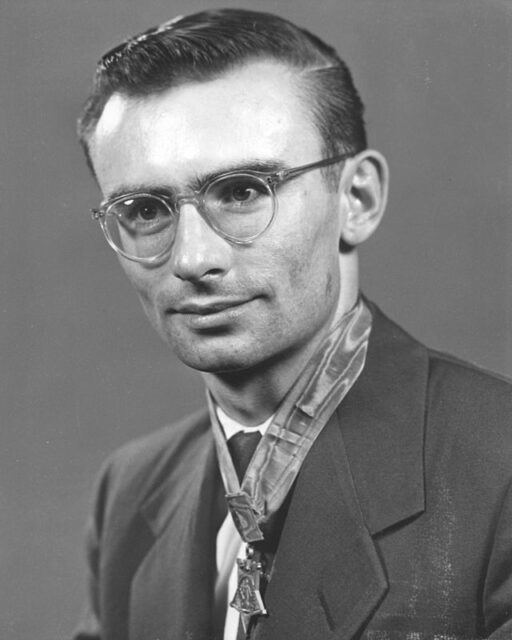
Robert Ernest Simanek was born in Detroit, Michigan, on April 26, 1930, as one of four brothers. He worked for the Ford Motor Company and General Motors after his high school graduation in 1948 and, three years later, enlisted in the US Marine Corps. It could be said that the future Medal of Honor recipient was destined to be a military man, given two uncles had served in World War II.
Simanek went through boot camp at Marine Corps Recruit Depot Parris Island, South Carolina, a “rude awakening” for what he was getting himself into. Later, however, he realized just how important this training was when it came to combat. More training was completed at Marine Corps Base Camp Pendleton, California, after which he was assigned to F Company, 2nd Battalion, 5th Marine Regiment, 1st Marine Division and sent to Korea as a rifleman and radioman.
Sent out on a routine morning patrol on August 17, 1952
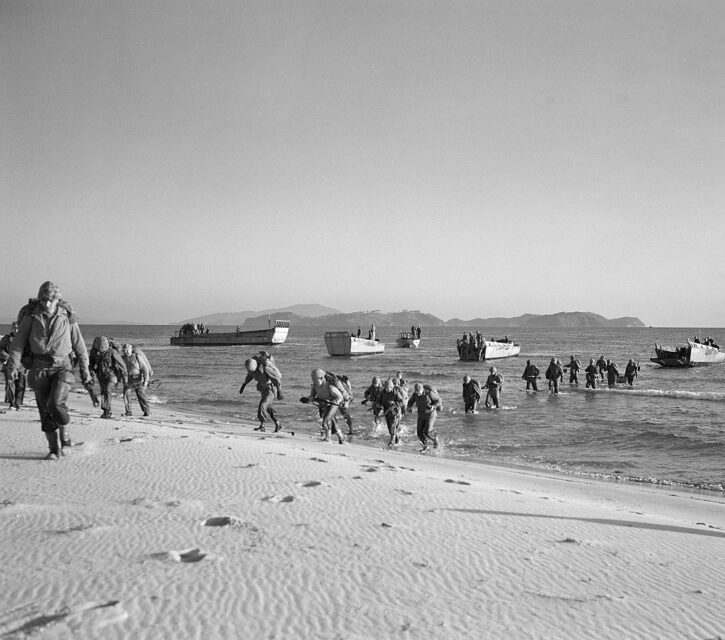
On August 17, 1952, during the Battle of Bunker Hill, Robert Simanek received orders to go on a routine morning patrol. While he didn’t know it at the time, his life would change forever that day. The Marine wasn’t pleased about this task, as he had been out on patrol throughout the night and hadn’t gotten any sleep. However, the area he was headed for, Outpost Irene, was known for a lack of activity.
“I had been to the outpost before and thought of it as a somewhat vacation because no action had ever been there all the time I’d been on that particular part of the line,” he recalled. “So, I took an old Readers’ Digest and a can of precious beer in my big back pocket and thought I was really going to have a relaxing situation. It didn’t turn out that way.”
Robert Simanek risked his life for his comrades
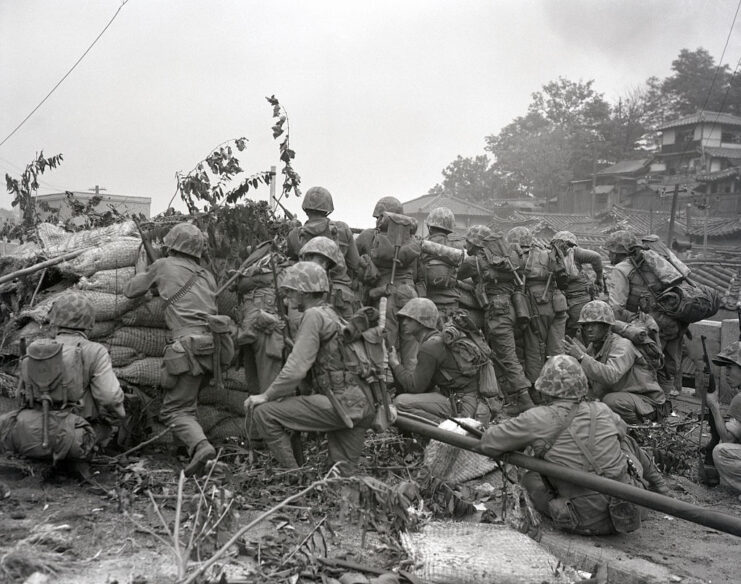
Robert Simanek and his fellow Marines were heading toward the outpost in a single file line when the area erupted in gunfire and explosions. One Marine was killed immediately, forcing Simanek and five others to hightail it back the way they came. They went into a small trench, but didn’t make it in without injury. One of the Marines had been hit in the chest, but survived.
Simanek fired a burst from his weapon into two nearby Chinese soldiers. With the group pinned down in the trench, the Chinese began throwing grenades at their position. After a failed attempt at diverting the enemy’s fire, two grenades landed in the trench. Simanek kicked away the first, but, judging he didn’t have the time to kick away the second, jumped onto the explosive. His body absorbed the blast, saving the lives of the men around him.
“It was training, it wasn’t any mental decision on my part at all,” he later said. “It was an automatic thing pushed by somebody.” Miraculously, Simanek actually survived the blast, with him saying, “Somehow I managed to use the right part of my body that didn’t hurt me that much.”
Not only did the Marine survive, but he stayed in the fight, radioing a tank for help. When the vehicle arrived, he and his fellow Marines used the opportunity to escape. Two comrades helped Simanek, but a blast from the tank accidentally injured the two, leading him to make the journey back by himself. “The idea that they couldn’t carry me – it was no doubt the best thing to do for them to get going,” he said.
Now alone, Simanek dragged himself away from the firefight, into the vicinity of American troops, who subsequently requested a helicopter evacuation. “I enjoyed that helicopter ride so much,” the Marine recalled. “I just couldn’t get over how beautiful it was. But then, I’d had a shot in the arm, and that sort of gave me a little extra sense of beauty.”
Receiving the Medal of Honor for his gallantry
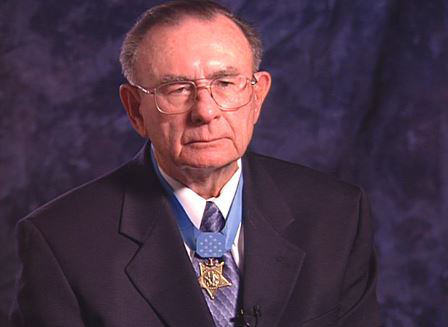
Robert Simanek’s wounds were tended to aboard the USS Haven (AH-12), after which he was sent to Japan, followed by a return to the United States. After receiving medical care on home soil, he was placed on the temporary disability retired list.
Toward the end of 1953, Simanek was awarded the Medal of Honor by President Dwight D. Eisenhower, at a ceremony at the White House. Even though, to us, his exploits are of a brave, selfless war hero, Simanek viewed them as some of the darkest moments of his life. Similarly to other decorated veterans, receiving the Medal of Honor took a heavy toll of the brave Marine.
“One of the hardest things about the medal is that you’re really not allowed to forget about it,” he said. “People will, in a good meaningful way, of trying to compliment you, bring about some memories that maybe you’d like to get rid of.”
After he’d recovered from his wounds, Simanek returned to civilian life, graduating from Michigan State University, marrying the love of his life, having children and working a career in business. On August 1, 2022, in Novi, Michigan, he passed away. He was 92 years old.
USS Robert E. Simanek (ESB-7)
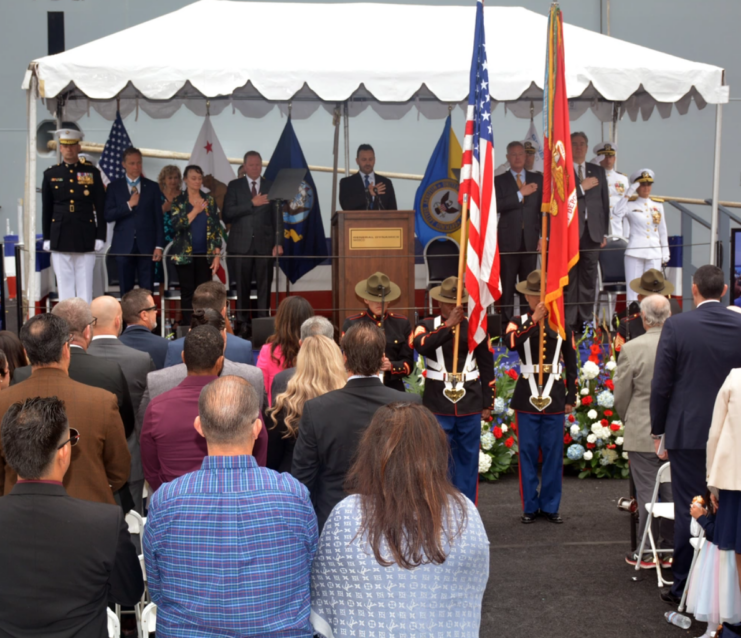
On January 15, 2021, then-Secretary of the Navy Kenneth Braithwaite announced the US Navy’s newest mobile expeditionary base would be named for Robert Simanek. Just over a year later, the National Steel and Shipbuilding Company (NASSCO), a division of General Dynamics, laid down the ship’s keel, with the authentication ceremony taking place on October 21, 2022.
Fast-forward to May 4, 2024, when the USS Robert E. Simanek (ESB-7) was officially christened, at a ceremony at the NASSCO shipyard in San Diego, California. Attended by the late Marine’s family, political figures and naval personnel, it occurred at the same time Simanek’s daughter, who is also the vessel’s sponsor, broke a bottle of champagne against the bow.
“This ship will serve as a floating testimony to Private First Class Simanek’s valor and esprit de corps that all Marines and Sailors carry with them,” Brig. Gen. Robert Weiler, Assistant Division Commander, 1st Marine Division, told attendees at the ceremony. “Just as Private First Class Simanek stood as a protector amongst his fellow Marines and Sailors, this ship will daringly sail across the oceans as a protector of American freedom.”
More from us: Seven American Soldiers Have Defected to North Korea Since the Korean War
Are you a fan of all things ships and submarines? If so, subscribe to our Daily Warships newsletter!
Following the ship’s completion, Robert E. Simanek was delivered to the Military Sealift Command (MSC). With the organization, she’ll undergo testing, qualification and preparation for service with the fleet, after which she’ll be deemed fully operational.
